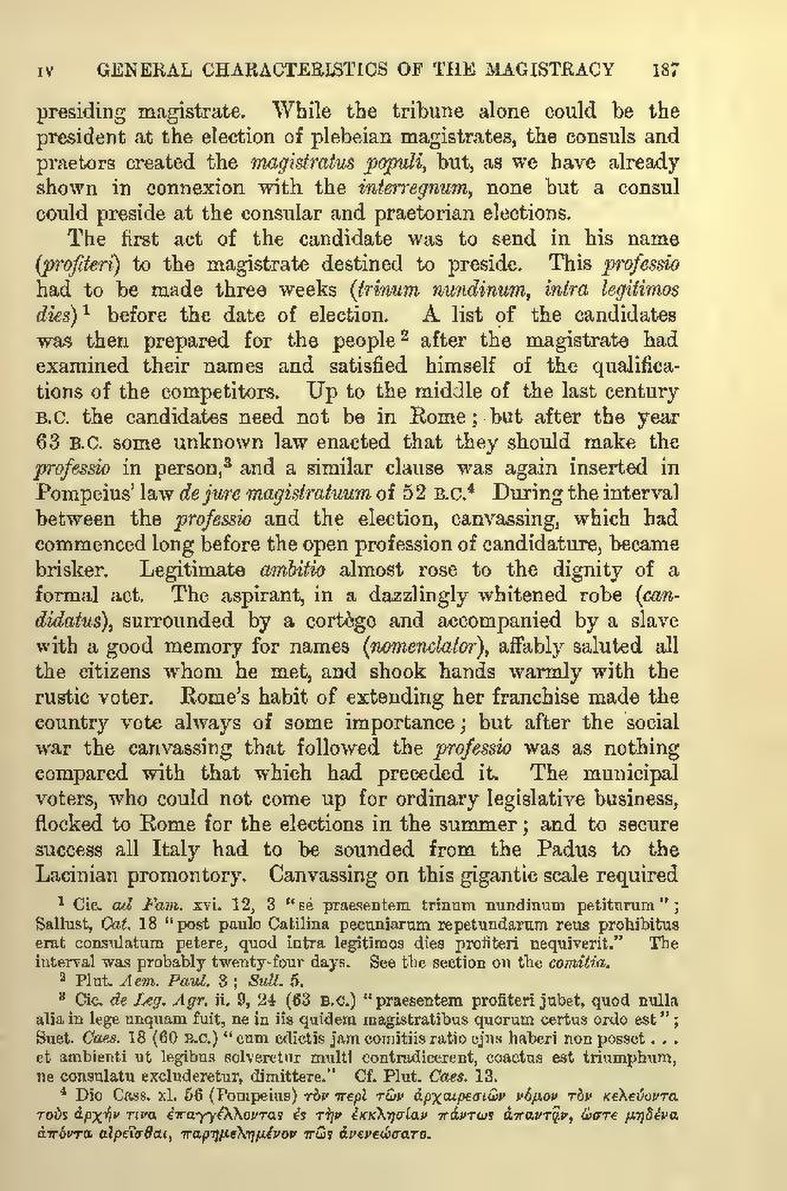presiding magistrate. While the tribune alone could be the president at the election of plebeian magistrates, the consuls and praetors created the magistratus populi, but, as we have already shown in connexion with the interregnum, none but a consul could preside at the consular and praetorian elections.
The first act of the candidate was to send in his name (profiteri) to the magistrate destined to preside. This professio had to be made three weeks (trinum nundinum, intra legitimos dies)[1] before the date of election. A list of the candidates was then prepared for the people[2] after the magistrate had examined their names and satisfied himself of the qualifications of the competitors. Up to the middle of the last century B.C. the candidates need not be in Rome; but after the year 63 B.C. some unknown law enacted that they should make the professio in person,[3] and a similar clause was again inserted in Pompeius' law de jure magistratuum of 52 B.C.[4] During the interval between the professio and the election, canvassing, which had commenced long before the open profession of candidature, became brisker. Legitimate ambitio almost rose to the dignity of a formal act. The aspirant, in a dazzlingly whitened robe (candidatus), surrounded by a cortège and accompanied by a slave with a good memory for names (nomenclator), affably saluted all the citizens whom he met, and shook hands warmly with the rustic voter. Rome's habit of extending her franchise made the country vote always of some importance; but after the social war the canvassing that followed the professio was as nothing compared with that which had preceded it. The municipal voters, who could not come up for ordinary legislative business, flocked to Rome for the elections in the summer; and to secure success all Italy had to be sounded from the Padus to the Lacinian promontory. Canvassing on this gigantic scale required.]
- ↑ Cic. ad Fam. xvi. 12, 3 "se praesentem trinum nundinum petiturum"; Sallust, Cat. 18 "post paulo Catilina pecuniarum repetundarum reus prohibitus erat consulatum petere, quod intra legitimos dies profiteri nequiverit." The interval was probably twenty-four days. See the section on the comitia.
- ↑ Plut. Aem. Paul. 3; Sull. 5.
- ↑ Cic. de Leg. Agr. ii. 9, 24 (63 B.C.) "praesentem profiteri jubet, quod nulla alia in lege unquam fuit, ne in iis quidem magistratibus quorum certus ordo est"; Suet. Caes. 18 (60 B.C.) "cum edictis jam comitiis ratio ejus haberi non posset . . . et ambienti ut legibus solveretur multi contradicerent, coactus est triumphum, ne consulatu excluderetur, dimittere." Cf. Plut. Caes. 13.
- ↑ Dio Cass. xl. 56 (Pompeius) [Greek: ton peri tôn archairesiôn nomon ton keleuonta tous archên tina epangellontas es tên ekklêsian pantôs apantan, hôste mêdena aponta haireisthai, parêmelêmenon pôs aneneôsato
